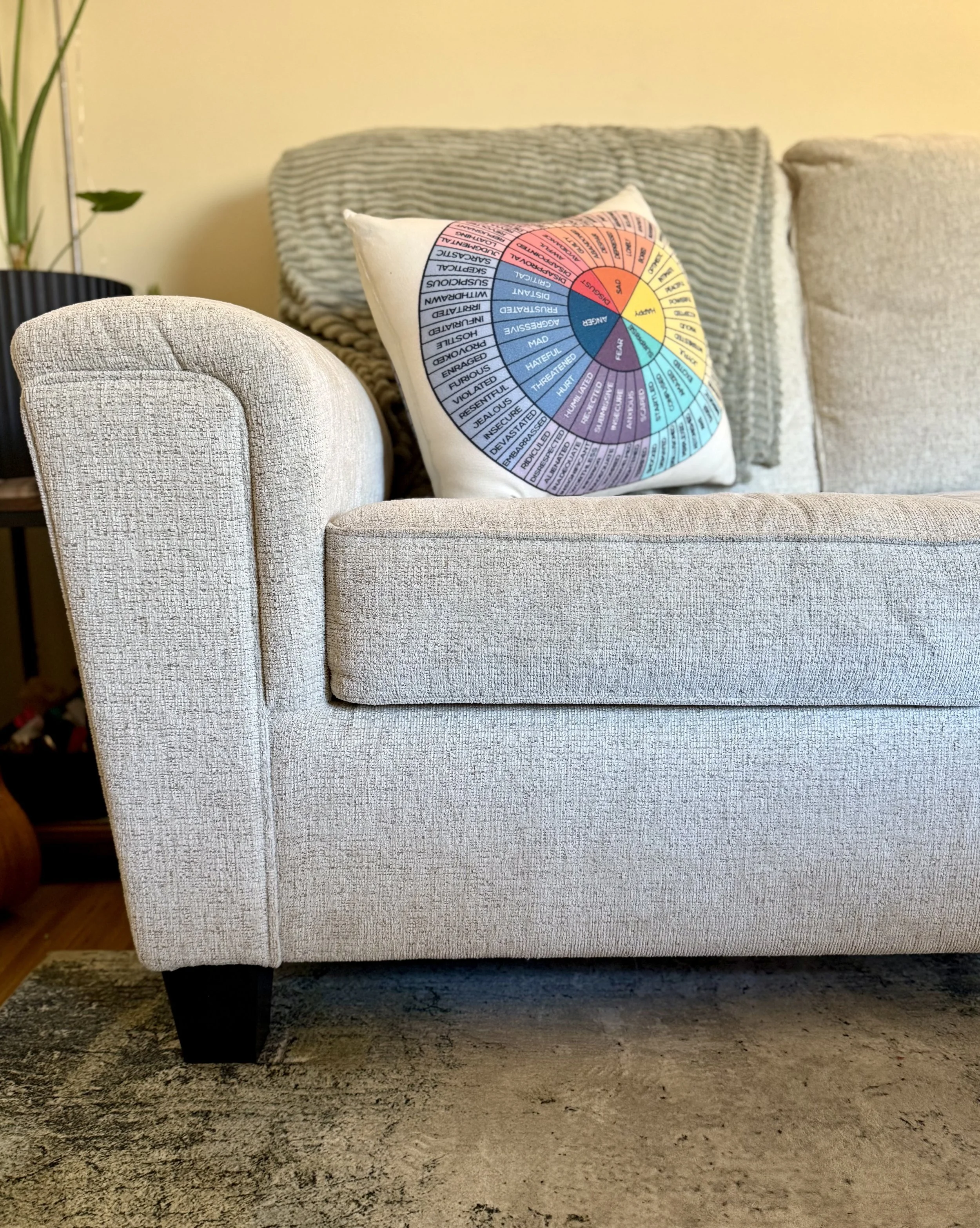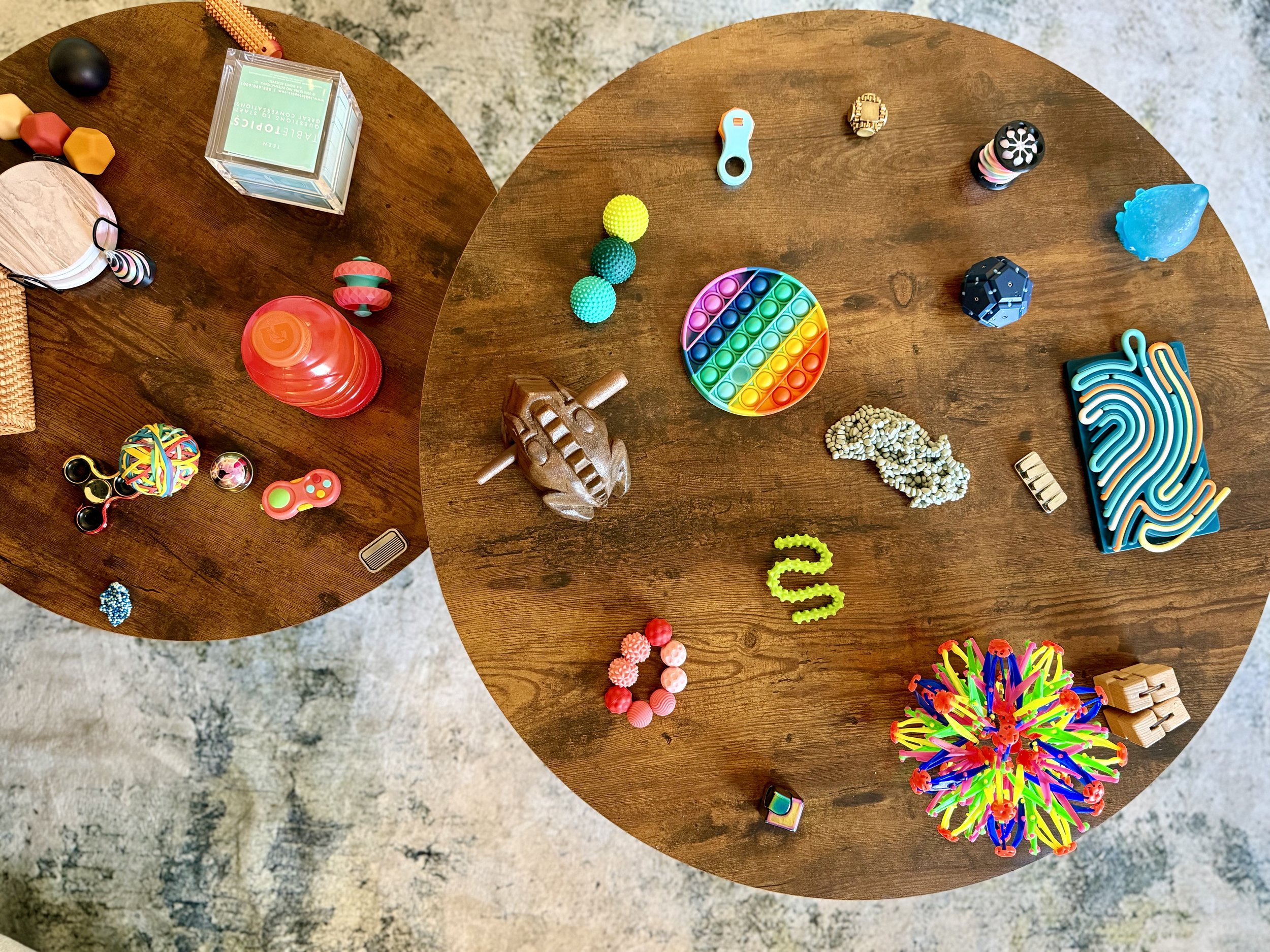
Support for the beautifully different brain.
You don’t need to work harder to fit in. You deserve support that fits you.
Maybe this sounds like you…
Maybe you’re an adult who’s just starting to wonder if you might be ADHD or autistic. You’ve always been sensitive, intuitive, creative but also exhausted from masking, overthinking, or trying to keep up with everyone else. You might have been labeled “gifted,” “shy,” or “lazy,” and spent years wondering why certain things feel so much harder than they seem for others.
Or maybe you were recently diagnosed late in life and you’re still unpacking what that means. You might feel relief and self understanding… mixed with grief for the years you spent blaming yourself for something that was never your fault.
Maybe you’re a parent of a newly diagnosed child trying to understand their unique brain, navigate the world of evaluations and school plans, and figure out how to help them feel safe, confident, and capable without losing yourself in the process.
Or maybe you have a teen who’s struggling to fit in, communicate emotions, or manage school demands, and you’re hoping to find someone who gets it someone who sees beyond the behaviors and helps them feel seen, accepted, and supported.
Feeling worn down from trying every behavioral chart, sticker system, or strategy that never really seems to help
Struggling with procrastination, motivation, or emotional regulation
Overwhelmed by sensory input or constantly fighting overstimulation
Struggling to connect with peers or partners, feeling “different” but not sure why
Tired of being told to “try harder” or “just be consistent”
Wanting to better understand how your brain works and how to work with it instead of against it
Looking for a therapist who feels safe, validating, and knowledgeable about neurodivergence not judgmental or pathologizing
You might be:
You don’t need to be “fixed.” You need a space where your unique way of being can breathe.
What Makes Our Approach Different
At Root Wellness, we specialize in working with ADHD and autistic individuals of all ages through a neurodivergent affirming, trauma informed, and compassionate lens.
We believe:
You are not broken your brain just works differently.
There is no one size fits all approach to healing or growth.
Real change happens when therapy feels safe, flexible, and tailored to you.
We know that what helps one person might not help another. That’s why our sessions can look and feel different from traditional talk therapy and that’s intentional.
Therapy with us can include:
Sitting in comfy chairs, on the floor, or walking outside
Using fidgets, art, music, or sand trays
Taking breaks, moving your body, or pausing for sensory regulation
Talking (or not talking!) communication can take many forms
Wearing what feels comfortable cozy clothes always welcome
Meeting virtually, in person, or outdoors
Exploring creative tools for focus, emotional processing, and self expression
You don’t have to have the “right” words. You don’t have to come perfectly prepared.
You just get to show up as you are and we’ll meet you there.
For Late Diagnosed Adults
You might be unpacking years of internalized messages about what it means to be “too much,” “too sensitive,” or “not disciplined enough.” You may be realizing that many of your struggles with focus, social connection, routines, or sensory overload were never about effort, but about fit.
Therapy can help you:
Rebuild self trust and self compassion
Understand your nervous system and sensory needs
Learn strategies that honor your energy and attention
Process the grief, anger, and relief that can come with diagnosis
Reduce masking and increase authentic self expression
Reconnect with joy, rest, and creativity
For Parents of Neurodivergent Children
If your child has recently been diagnosed (or you suspect they may be ADHD or autistic), you may feel both love and uncertainty. You want to support them but you might be overwhelmed by the amount of information out there, or discouraged by advice that doesn’t fit your child’s personality.
We can help you:
Understand your child’s behaviors through a neurodivergent lens
Learn ways to connect that support regulation and trust
Build routines that actually work for your family
Shift from “compliance based” approaches to relationship based ones
Reduce shame, meltdowns, and burnout (for you and your child!)
Advocate for your child in schools and other systems
Feel less alone navigating a world that can be hard on sensitive, curious, big feeling kids
For Teens & Young Adults
You might feel different from your peers like you’re always trying to catch up, keep it together, or hide parts of yourself to fit in. School might feel overwhelming. Friendships might be confusing. You might feel like no one really gets you.
Therapy can help you:
Build confidence in your strengths and identity
Understand your emotions and communicate them safely
Navigate friendships, dating, and social expectations
Manage executive functioning challenges like motivation and organization
Find your voice and learn how to advocate for yourself
Discover what regulation, rest, and connection look like for you
What Therapy Can Help With
Across all ages, our work can support:
Emotional regulation and sensory awareness
Reducing burnout and overwhelm
Self understanding and self acceptance
Unmasking safely and at your pace
Building executive functioning strategies that actually stick
Advocacy and boundary setting
Healing from trauma, shame, or misdiagnosis
Reconnecting to your body, creativity, and joy
The Root Wellness Difference
Our therapists are trained and passionate about helping neurodivergent clients thrive in a world that isn’t always built for them. We don’t force rigid structure, and we don’t pathologize your needs. We celebrate flexibility, curiosity, and collaboration.
Therapy here can look however it needs to because you deserve care that adapts to you, not the other way around.
You don’t have to keep trying to “get it right.”
You just need space to feel safe, seen, and supported exactly as you are.
FAQs
-
We do not provide formal diagnostic evaluations for ADHD or autism. However, we often support clients who are exploring the possibility of being neurodivergent, whether they’re self-diagnosed, formally diagnosed, or still wondering.
Self-diagnosis is widely accepted in the autistic community and can be a meaningful, valid way of understanding yourself. You don’t need an official label to benefit from therapy here.
If you’d like a formal evaluation, we have a list of trusted local providers who specialize in comprehensive ADHD and autism assessments, and we’re happy to share those referrals.
-
Therapy is flexible and tailored to your needs. Some sessions look like traditional talk therapy; others might include:
EMDR for processing trauma and unhelpful beliefs
Exploring traits of neurodivergence and how they show up day-to-day
Working through negative self-talk, perfectionism, or masking
Creating systems for success that match your energy and attention
Building self-advocacy and empowerment skills
Processing burnout, sensory overwhelm, or identity exploration
Using creative tools like art, sand, or movement
You get to help decide what works best for you. There’s no “right” way to do therapy here, only the way that helps you feel safe, understood, and supported.
-
Absolutely. Many of our clients come in wondering if they might be ADHD or autistic. We can explore that curiosity together, helping you understand your patterns, needs, and strengths.. even without a formal evaluation.
-
That’s completely up to you. Some clients choose to take medication for ADHD or related challenges, and others don’t. We support both paths equally.
Our role is to help you explore what works best for your brain and lifestyle. If medication is something you’re curious about, we can provide psychiatry referrals or collaborate with your prescriber to support your care.
-
Yes. Wholeheartedly. Many of our clients are LGBTQ+ and neurodivergent, and we understand how those identities can intersect in powerful and complex ways.
You’ll always be met with affirming, inclusive care that honors your full identity and lived experience. -
We’re not a one-size-fits-all kind of practice.
We don’t use rigid behavioral plans or push “strategies” that don’t work for your brain.Instead, we:
Work with your neurotype, not against it
Offer flexibility — virtual, in-office, or outdoor sessions
Create sensory-friendly spaces (fidgets, cozy seating, soft lighting, no judgment)
Use trauma-informed, neurodivergent-affirming approaches
Center authenticity, rest, and connection over “performance”
We want therapy to feel like a place you can finally exhale, where you don’t have to mask, explain, or apologize for being yourself.
-
That’s completely okay. Many people come to us unsure where to start, they just know they’re tired of trying to “do it right” on their own.
Our free consultation is a chance to talk, explore what you’re looking for, and see if we’re a good fit. You don’t have to have it all figured out before you reach out.




